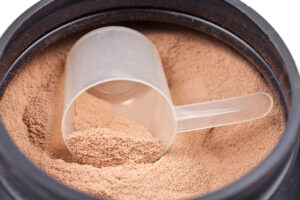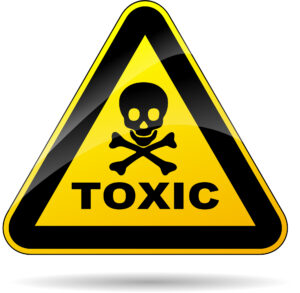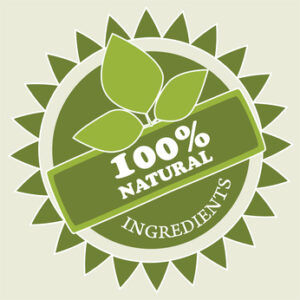Why Are Protein Supplements Contaminated?
Author: Dr. Stephen Chaney
 There are lots of good reasons for using protein supplements.
There are lots of good reasons for using protein supplements.
- Some people use them as healthier substitutes for fatty, cholesterol-rich animal protein foods.
- Some people use them as calorie-controlled meal substitutes to lose weight.
- Some people use them to build muscle mass.
- Some people use them to retain muscle mass as they age.
And these reasons are just the tip of the iceberg. All these uses are meant to build health.
But the latest headlines claim that many protein supplements are toxic. They contain heavy metals that can destroy your health. In particular, the headlines claim that a high percentage of popular protein supplements are contaminated with lead and/or cadmium.
That’s downright scary because both lead and cadmium accumulate in the body and…
Lead can cause:
- Developmental delay, learning difficulties, and behavioral problems in children.
- High blood pressure, miscarriage, stillbirth, or premature birth in pregnant women.
- Loss of short-term memory, depression, fatigue, and fertility problems in adults.
Cadmium can cause:
- Flu-like symptoms, lung damage, kidney disease, and bone disease.
So, I knew you would want me to examine the studies behind the headlines and put them into perspective for you.
The first study was an analysis of popular protein supplements by an organization called “The Clean Label Project”.
And because the first study found that chocolate-flavored protein supplements were the most likely to be contaminated, a second study (JM Hands et al, Frontiers in Nutrition, 11:1366231, 2024) looking at the lead and cadmium levels in dark chocolate and cocoa products in the USA was also relevant. This study was performed by ConsumerLab.com.
How Were These Studies Done?
The first study purchased and tested 160 of the top-selling protein supplements based on Nielsen and Amazon’s best-seller lists in 2024. These supplements represented the top 70 brands and 83% of the protein supplement market.
The second study purchased and tested 72 cocoa-containing products from retail sources between 2014 and 2022.
In both cases the products were then sent to independent analytical laboratories the be tested for heavy metal contaminant by a method called Inductively Coupled Plasma Mass Spectrometry or ICP-MS.
Is Your Protein Supplement Toxic?

In assessing heavy metal contamination in foods there are two standards that can be used – the FDA standards or the more restrictive California Proposition 65 standards.
- The FDA has set an interim reference level (IRL) for the maximum amount of lead that can be consumed daily from food. Anything above the IRL standard is considered to be a concern for long-term health effects.
- The FDA has set a toxicology reference value (TRV) for cadmium. Again, anything above this level is a concern.
- The California Proposition 65 standards for lead and cadmium are called the maximum allowable dose levels or MADLs.
The first study interprets its findings in the context of the proposition 65 MADLs only. The second study interprets its findings in the context of the Proposition 65 MADLs, but cross-references them to the FDA standards.
With that in mind, here are the results.
 The first study on protein supplements reported that:
The first study on protein supplements reported that:
- 47% of the products tested exceeded California Proposition 65 safety thresholds (MADLs) for lead and/or cadmium.
-
- 21% of products tested exceeded Proposition 65 standards for lead by ≥ 2-fold.
- Plant-based protein supplements were more likely to be contaminated than animal-based protein supplements.
-
- 77% of plant-based protein supplements exceeded Proposition 65 standards for lead.
-
- 28% of whey-based protein supplements exceeded Proposition 65 standards for lead.
-
- 26% of collagen protein powders exceeded Proposition 65 standards for lead.
- Organic protein supplements were more likely to be contaminated with heavy metals than non-organic protein supplements.
-
- 79% of organic protein supplements exceeded California Proposition 65 standards for lead.
-
- 41% of organic protein supplements exceeded Proposition 65 standards for lead by ≥ 2-fold.
-
- On average organic protein supplements contain 4-times more lead and 2-times more cadmium than non-organic protein supplements.
- Chocolate-flavored protein supplements were more likely to be contaminated with heavy metals than vanilla-flavored protein supplements.
-
- 65% of chocolate-flavored protein supplements exceeded Proposition 65 standards for lead.
-
- 29% of chocolate-flavored protein supplements exceeded Proposition 65 standards for lead by ≥ 2-fold.
-
- On average chocolate-flavored protein supplements contain 4-times more lead than vanilla-flavored protein supplements.
The authors concluded, “This report aims to spark an important conversation about the safety of protein supplements and empower consumers to make more informed choices, while urging manufacturers to prioritize ingredient purity.”
 The results for chocolate-flavored protein were not unexpected as illustrated by study 2, which looked at 72 chocolate-containing products of all kinds purchased in the United States. This study found:
The results for chocolate-flavored protein were not unexpected as illustrated by study 2, which looked at 72 chocolate-containing products of all kinds purchased in the United States. This study found:
- 43% of products tested exceeded Proposition 65 standards for lead.
- 35% of products tested exceeded Proposition 65 standards for cadmium.
- Non-GMO and Fair-Trade Certified products were just as likely as products without these certifications to be contaminated with heavy metals.
- Organic products were 3 times more likely to be contaminated with lead and cadmium than non-organic products.
- For comparison, only 2.8% of products tested exceeded the less rigorous FDA standard for lead.
Why Are Protein Supplements Contaminated?
 You have every reason to be shocked by this report. You are probably wondering, “How could this happen? Why are so many popular protein supplements contaminated with heavy metals?”
You have every reason to be shocked by this report. You are probably wondering, “How could this happen? Why are so many popular protein supplements contaminated with heavy metals?”
Let me divide my answer to your questions into 4 individual questions.
#1: Why don’t companies simply test for heavy metal contamination?”
The answer is that the ICP-MS equipment needed to test for heavy metals is very expensive. A good ICP-MS system can easily cost upwards of $250K. And the maintenance contract needed to keep it running efficiently can cost $10K per year.
Consequently, most companies and many independent testing laboratories don’t have the ICP-MS equipment needed to test for heavy metal contamination.
Even if a company does some quality controls on their products, adding quality controls for heavy metal contamination requires a substantial additional investment. Many companies simply don’t make this investment.
#2: Why are plant-based protein supplements more likely to be contaminated with heavy metals than animal-based protein supplements?
The answer is that the contamination likely comes from environmental exposure and agricultural practices.
- Lead and cadmium occur naturally in the soil and a certain amount of each leach into ground water every time it rains.
- Heavy metals (especially lead) can be released into the groundwater and air by nearby industrial facilities and power plants. If the heavy metals are in groundwater, they will be taken up by the plant’s root system. If in the air, they will be deposited on the plant.
-
- This is a particular problem in developing countries with less rigorous environmental controls than the US.
-
- In today’s world, raw materials for protein supplements can be sourced anywhere in the world and raw materials from developing countries are often less expensive than those from the US.
- Groundwater contamination is a particular problem for rice because it spends most of the growing season in standing water. In fact, rice is one of the foods along with chocolate that is most likely to be contaminated with lead.
-
- Soy protein has fallen out of favor in recent years. And a large percentage of the protein in non-soy plant-protein products comes from rice because it is cheap and mild flavored.
 #3: Why are organic protein supplements more likely to be contaminated with heavy metals than non-organic protein supplements?
#3: Why are organic protein supplements more likely to be contaminated with heavy metals than non-organic protein supplements?
While this seems to be a “head scratcher”, the answer is simple.
In my book, “Slaying the Food Myths”, food myth #8 is “Organic means pure”. That’s not true because:
- The term organic simply means the crop was grown using organic farming methods.
-
- It does not take into account contaminants that may have come from groundwater or air pollution.
-
- It does not require any quality controls to make sure that the crop is not contaminated.
- Unfortunately, many manufacturers buy into the “organic means pure” myth and do not feel the necessity of testing organic raw materials for heavy metal contamination.
#4: Why are chocolate-flavored protein supplements more likely to be contaminated with heavy metals than vanilla-flavored protein supplements?
Again, the answer is simple.
- Chocolate is derived from the seed of cacao trees.
- Cacao trees are subject to the same groundwater and air pollution as other plants.
- Cacao trees are grown in developing countries with poor environmental regulations.
In short,
- Plant proteins are more likely to be contaminated by heavy metals through groundwater and air pollution.
- Many companies buy into the “organic means pure” myth and don’t test organic raw materials for heavy metal contamination.
- The raw material for chocolate flavoring is likely to be contaminated with heavy metals because it comes from developing countries with poor environmental standards.
- Testing for heavy metal contamination is expensive, so many companies don’t do it.
These Results Aren’t Surprising To My
 I’m not surprised by these results. To explain why, let me share a couple of conversations I have had with a friend who worked for a very reputable supplement manufacturer. The company he worked for has an ICP-MS system in their Quality Control facility and tests all incoming raw ingredients for heavy metal contamination.
I’m not surprised by these results. To explain why, let me share a couple of conversations I have had with a friend who worked for a very reputable supplement manufacturer. The company he worked for has an ICP-MS system in their Quality Control facility and tests all incoming raw ingredients for heavy metal contamination.
In one conversation he shared the story of a time in which the company wanted to develop a line of organic tea products. When he asked colleagues in the industry where they got their organic tea leaves, they told him about a farming operation in India that produced the world’s finest organic tea leaves.
He eagerly sent an employee to obtain some leaves from that farm. But when the employee returned and tested the leaves in their quality control facility, they were the most contaminated raw materials they had ever tested.
With a little investigation they found out that the farm used the finest organic farming practices, but they were only 30 miles away from a large industrial complex that had thoroughly contaminated their groundwater. The take home message from this conversation was that organic is no guarantee of purity.
In another conversation he told me about the time that he saw another company’s protein supplement on the shelf. The label said it was organic, non-GMO, and Fair-Trade certified. The label claimed it was “as pure as the driven snow”.
But he noticed that the product was mostly rice protein, so he bought it and had it tested in his company’s quality control laboratory. It had 4-times the amount of lead allowed by Proposition 65 standards. The take home message from this conversation was that some protein supplements are contaminated with lead, and organic, non-GMO, and Fair-Trade certification on the label is no guarantee of purity.
What Do These Studies Mean For You?
 The first study only compared heavy metal contamination in protein supplements to the maximum safe levels set by California’s Proposition 65.
The first study only compared heavy metal contamination in protein supplements to the maximum safe levels set by California’s Proposition 65.
The second study compared lead contamination in chocolate products with both the Proposition 65 standard and the much less stringent FDA standard. 43% of chocolate products exceeded the Proposition 65 standard, but only 2.8% exceeded the FDA standard.
Some experts like to quibble about which standards heavy metal contamination should be compared to. They will tell you the California Proposition 65 standards are too stringent, and products are perfectly safe if they don’t exceed FDA standards.
For example, the authors of the second study concluded, “…heavy metal contamination…may not pose any appreciable risk for the average person when consumed in a single serving. However, consuming one serving per day in combination with other sources of heavy metals…may be a public health concern.”
The scientist in me wants to accept that statement. However, the consumer advocate in me is screaming,
- Weren’t you paying attention. Many protein supplements contain lead and cadmium.
- The toxicity associated with these heavy metals is cumulative.
- Most protein supplement users are consuming them daily.
- And if they are following a healthy diet, they are probably consuming dark chocolate and rice as well.
It is truly consumer beware in the protein supplement market. Unfortunately, the Clean Label report did not list the protein supplements with lead and cadmium contamination, probably to avoid lawsuits.
So, what can you do to avoid potentially toxic protein supplements? You can’t rely on product labels or generic purity claims.
But you can do a little sleuthing on your own. Here are the questions you should ask.
- How many quality control tests do you run on the ingredients used in your protein supplements? The answer should be a large number.
- Do you test for heavy metal contamination? The answer should be yes.
- Do you reject raw ingredients with heavy metal contamination? The answer should be yes.
And once you find a company that answers these 3 questions correctly stick with them. A cheaper product with poor quality controls is not worth the risk of heavy metal contamination.
The Bottom Line
A recent study looked at heavy metal contamination in protein supplements. It found that:
- 47% of the products tested exceeded California Proposition 65 safety thresholds (MADLs) for lead and/or cadmium.
- Plant-based protein supplements were more likely to be contaminated with heavy metals than animal-based protein supplements.
- Organic protein supplements were more likely to be contaminated with heavy metals than non-organic protein supplements.
- Chocolate-flavored protein supplements were more likely to be contaminated with heavy metals than vanilla-flavored protein supplements.
The authors of the study said, “This report aims to spark an important conversation about the safety of protein supplements and empower consumers to make more informed choices, while urging manufacturers to prioritize ingredient purity.”
For more details on this study, why organic protein supplements were more likely to be contaminated, and how you can choose pure protein supplements read the article above.
These statements have not been evaluated by the Food and Drug Administration. This information is not intended to diagnose, treat, cure or prevent any disease.
______________________________________________________________________________
My posts and “Health Tips From the Professor” articles carefully avoid claims about any brand of supplement or manufacturer of supplements. However, I am often asked by representatives of supplement companies if they can share them with their customers.
My answer is, “Yes, as long as you share only the article without any additions or alterations. In particular, you should avoid adding any mention of your company or your company’s products. If you were to do that, you could be making what the FTC and FDA consider a “misleading health claim” that could result in legal action against you and the company you represent.
For more detail about FTC regulations for health claims, see this link.
https://www.ftc.gov/business-guidance/resources/health-products-compliance-guidance
______________________________________________________________________
About The Author
 Dr. Chaney has a BS in Chemistry from Duke University and a PhD in Biochemistry from UCLA. He is Professor Emeritus from the University of North Carolina where he taught biochemistry and nutrition to medical and dental students for 40 years.
Dr. Chaney has a BS in Chemistry from Duke University and a PhD in Biochemistry from UCLA. He is Professor Emeritus from the University of North Carolina where he taught biochemistry and nutrition to medical and dental students for 40 years.
Dr. Chaney won numerous teaching awards at UNC, including the Academy of Educators “Excellence in Teaching Lifetime Achievement Award”.
Dr Chaney also ran an active cancer research program at UNC and published over 100 scientific articles and reviews in peer-reviewed scientific journals. In addition, he authored two chapters on nutrition in one of the leading biochemistry text books for medical students.
Since retiring from the University of North Carolina, he has been writing a weekly health blog called “Health Tips From the Professor”. He has also written two best-selling books, “Slaying the Food Myths” and “Slaying the Supplement Myths”. And most recently he has created an online lifestyle change course, “Create Your Personal Health Zone”. For more information visit https://chaneyhealth.com.
For the past 45 years Dr. Chaney and his wife Suzanne have been helping people improve their health holistically through a combination of good diet, exercise, weight control and appropriate supplementation.
